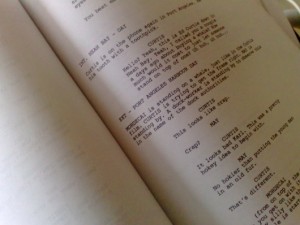 The format and layout for dialogue are similar to that used for a play.
The format and layout for dialogue are similar to that used for a play.
- You write (stage)directions describing the characters clothing, hairstyles, the setting, props, furniture, telling the actors what actions and body language to use, where to move etc…
- You write the name of the character followed by a colon to the left of the page, followed by their dialogue. As the dialogue continues don’t write directly underneath the name so it’s easy to see who’s speaking at all times (see below).
- For film scripts, use a separate line for the characters name and centre it, then write the dialogue underneath – as in the picture above! Directions on how to say specific lines are written in brackets.
- You tell the reader where & when the action is taking place. Int = interior Ext = exterior.
Look at the following example:
Int. Bedroom day.
Marian is dancing to loud dance music. The door opens but she doesn’t notice.
Sean: Hey! HEY LOSER (shouting).
Marian: Sean get OUT! Jesus (muttering) can I not get five minutes to myself?
Marian goes to dresser, ties up loose hair, switches off iPod dock.
Sean: (quietly) Mam needs you downstairs.
Marian: (apologetic) Oh. OK. Is she ok? Did she take her tablets?
Sean: She’s fine M. Don’t panic. She just needs you to help with dinner. I tried
but she didn’t trust me not to chop a finger off and stick it in with the
carrots!
Marian: (smiling, relieved) Don’t blame her! Grand so, I’ll be down in a
minute.
Sean exits. Marian goes to the mirror, looks at herself long and hard, sighs, turns and exits.
Cut to:
Ext. Garden same day.
Marian’s mother Susan is standing under a tree staring vacantly up into the branches.
Marian: What are you doing Mam? Sean said you were making dinner?
Susan: (confused) I thought I heard your father’s voice. In the tree. But he’s not
here.
Marian: (distressed) He’s not in the tree Mam. (to herself) He’s not anywhere.




